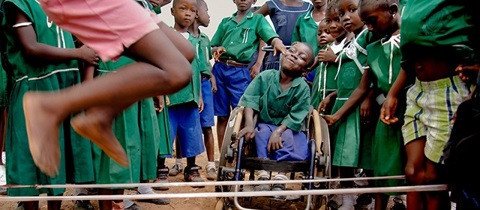
GCED Basic Search Form
Quick Search
أنت هنا
الأخبار

Only around a quarter of countries in Latin America and the Caribbean have inclusive education laws covering all learners.
The new Global Education Monitoring (GEM) report published today, June 23, by UNESCO shows the extent of exclusion in education now further exacerbated by Covid-19. In the Latin America and Caribbean region, only around a quarter of countries have inclusive education laws covering all learners. The 2020 Global Education Monitoring (GEM) Report shows that inequalities will have deepened during the pandemic. It calls on the region to foster more resilient and equal societies by concentrating on those being left behind as schools re-group.
Rethinking the future of education is all the more important following the Covid-19 pandemic, which further widened and put a spotlight on inequalities. Failure to act will hinder the progress of societies.
Audrey Azoulay, Director-General of UNESCO

Exclusion is persistent: This year’s Report, All Means All, is the fourth in the GEM Report annual series, which monitors progress across 209 countries towards the education targets in the Agenda 2030 for Sustainable Development. It will be followed by a regional report for Latin America and the Caribbean this October.
The education crisis during Covid-19 was fuelled by deep pre-existing inequalities. Even before the pandemic, almost 12 million children and youth were excluded from education in Latin America and the Caribbean, with poverty the main constraint to access.
Education systems are not adapting to students needs, leaving one in four 15-year-old students globally reporting feeling like outsiders at school. The region is one of the most linguistically diverse in the world, but education systems do not always reflect this: In grade 3, students who do not speak the language of the test are 3 times less likely to be able to read a story.

Exclusion can be very blatant. Alongside today’s new Report, the GEM Report has launched a new website, PEER*, with descriptions of laws and policies on inclusion in education for every country in the world. PEER shows that many countries still practice segregation in education, which can feed stereotyping, discrimination and alienation: 42% of countries in the region have laws calling for children with disabilities to be educated in separate settings. In practice, not many mainstream primary schools receive students with disabilities; at most 40%, according to the latest comparable data.
Covid-19 has given a real opportunity to think afresh about our education systems. Yet, moving to a world that not only values but welcomes diversity won’t happen overnight. There is an obvious tension between teaching all children under the same roof and creating an environment where students learn best. But, if Covid-19 taught us something, it is that failure to act is not an option; there is scope to do things differently if we put our minds to it.
-- Manos Antoninis, Director of the Global Education Monitoring Report
There is a chronic lack of quality data on those left behind
Nine countries in the region do not collect education data on children with disabilities in their Education Management Information Systems. Figures on learning are taken from school even if many are not participating. And learning assessments are often too difficult for some of the most marginalised students: three-quarters of students in the region who did no better on multiple choice questions than random guessing were considered proficient in reading.
There are signs of moves towards inclusion through assistive technology.
The Report and its PEER website note many countries using positive, innovative approaches to transition to inclusion.
In Grenada, five visually impaired students were supported in transferring from special to mainstream schools in 2004, using computers with screen readers, magnifiers, special keyboards and various Braille tools. Two trained professionals and a trained instructor visited the schools and assisted students, who then took the Caribbean Secondary Education Certificate. It was the first time blind students passed an examination at this level.
The report includes a set of key recommendations for the next 10 years launched in a digital campaign, All means All, that will help countries achieve the 2030 inclusive education targets.
URL:
